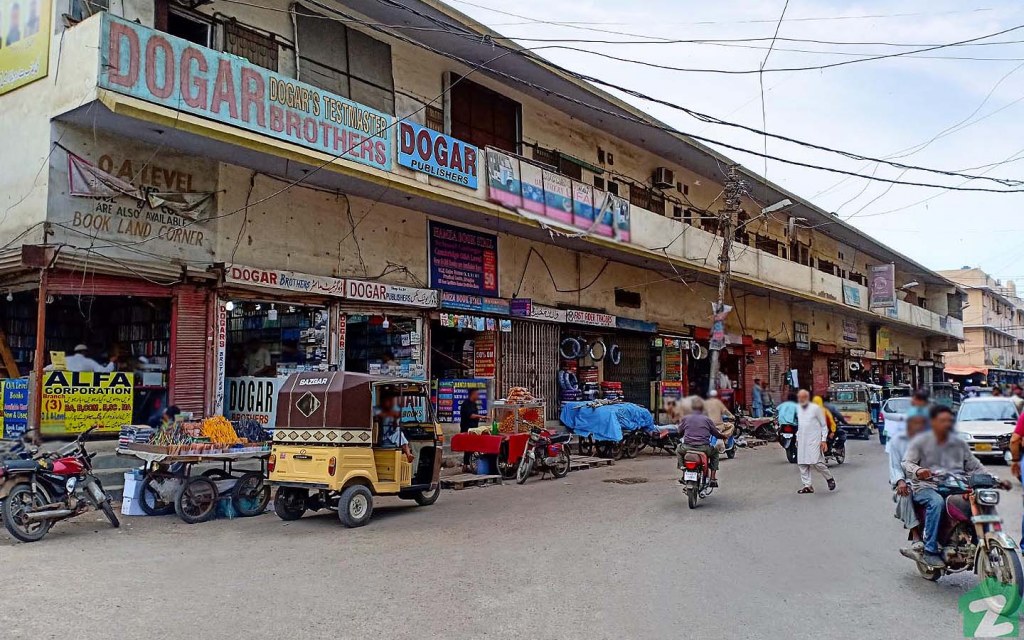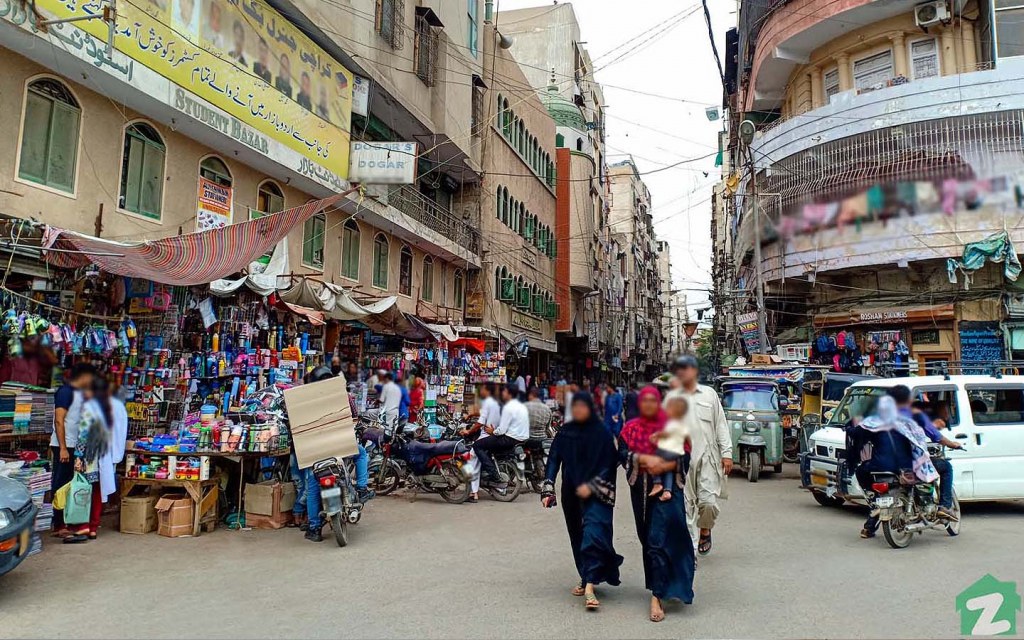Nestled in one of the oldest and most densely populated areas of the city, Urdu Bazaar is an ancient hub of literature and scholastic books in Karachi that continues to bustle with almost chaotic energy despite being more than half a century old and visibly worn out. At any given day, you are bound to find hordes of students, booklovers and parents navigating through the tightly-packed streets of Urdu Bazaar, Karachi, striving to find books and other academic materials that are not easily available elsewhere.
The present-day Urdu Bazaar, Karachi, located on M.A. Jinnah Road in Saddar Town was set up in the 1950s. However, its history dates back all the way to the Mughal Era, making it one of the oldest book markets not only in Pakistan but also in the subcontinent. Although the infrastructure of this historic market has visibly deteriorated with time, it is still considered the one-stop source for everything ranging from children’s storybooks to biographies of foreign scholars and from books on Islamic theology to academic literature. The market also features a large number of stationery shops, paper wholesalers, small printing presses and vendors selling all publishing-related material.
For those who live in Karachi, this market is no less than a cultural heritage site, that has withstood the test of time and remained true to its roots. In fact, it is one of the main reasons why Karachi is considered the perfect city for bookworms.
However, if you haven’t had an opportunity of buying books from Urdu Bazaar or are unfamiliar with its sombre past, this blog is meant just for you.
Without further ado, here is all you need to know about the history and evolution of this age-old market in the City of Lights.
History of Urdu Bazaar, Karachi

According to most historians, the original Urdu Bazaar started out in the imperial city of Delhi during the Mughal Era. Since the word ‘Urdu’ is a derivative of the Turkish word for ‘army’ or ‘armed forces’ and ‘bazaar’ stands for ‘market’ in Persian, it is believed that this market was formed around the time Urdu began to gain prominence in the region following the arrival of Muslim armies. The Urdu Bazaar in Delhi was located near Red Fort and drew writers, travellers, researchers, poets and scholars from all parts of the subcontinent and beyond.
However, as the records suggest, the book market was mostly destroyed during the War of Independence in 1857. While the remnants of the original Urdu Bazaar continued to dot the streets of the city for years to come, it was nothing but a shadow of its former self. Slowly, the historic book stores were replaced by vendors selling fabric, fragrances and other items.
Following the partition of subcontinent and creation of Pakistan in 1947, a small market reminiscent of the original Urdu Bazaar was set up in the port city of Karachi. It was a small market comprising 15 to 20 stalls mostly run by immigrants who had left their homeland for the newly-created country. A few years later, the market was shifted to its current location on M.A. Jinnah Road in Saddar, which was already the most popular business district in the City of Lights. With time, the market began to expand. Most of the bookshops in Urdu Bazaar, Karachi, are still run by second and third-generation immigrants.
Since independence, similar markets also emerged in other cities of Pakistan. The sprawling Urdu Bazaar in Lahore is the largest of them all. The ones in Rawalpindi, Multan and Peshawar are also pretty old. Nonetheless, where most of the other Urdu Bazaars slowly made space for gift shops and roadside eateries, the historic Urdu Bazaar in Saddar, Karachi, proudly stood firm in its essence and legitimacy.
Present-Day Urdu Bazaar, Karachi

Over the past decades, Urdu Bazaar in Saddar, Karachi, has evolved from a mere collection of bookstores to a hub of all printing and publishing-related activities in the city.
Students visiting the market can easily find course material for every subject, including second-hand course books by foreign authors that originally cost several thousand rupees. Apart from academic books, you can also purchase collections of past papers and notes for almost every subject offered in universities across Pakistan. The preparatory material for SAT, GRE or CSS exams along with foreign language tests is also widely available throughout Urdu Bazaar. The book vendors at the vintage market might not be well-versed in English, but they can help you find whatever you’re looking for quite easily.
While the market boasts a large variety of English literature as well as books in other foreign languages, the main speciality of Urdu Bazaar lies in its impressive collection of books written in Urdu. Published work of every Urdu author can be found in this vibrant book market. In fact, while sifting through the stacks of old books and manuscripts, you may even come across some limited edition classics published a century ago or priceless manuscripts that have been lying there unnoticed for decades. Who knows, you may even stumble upon a precious first-edition while you’re at it.
It is also important to mention that books in Urdu Bazaar are available at quite reasonable rates. So, if you’re looking to buy affordable books in Karachi, this is it.
Furthermore, a number of publishers have also set up their offices in the area. Urdu Bazaar is also a popular spot for printing books, magazines, posters, brochures, banners and even wedding cards. School items for children, including stationery and craft material, are also available in the market. Graduate and postgraduate students, especially those in the field of medicine, can also buy equipment and tools related to their studies at Urdu Bazaar. If you want to buy quality art supplies, charts, paintbrushes, lab and office equipment at lower rates than other book markets in Karachi, Urdu Bazaar is perhaps your best bet.
Since a number of fancy and bigger bookshops have popped up across the city over the past years and most people prefer buying books online with a few simple clicks on their gadgets, most vendors in Urdu Bazaar, Karachi, have also started providing free home delivery service across the city with a cash-on-delivery option for the convenience of the customers.
Similar markets have also appeared in different parts of the bustling metropolis, with the New Urdu Bazaar in Gulshan-e-Iqbal and another in Nazimabad being the most popular ones.
So, that was all you needed to know about exploring Urdu Bazaar, which boasts the best collection of books in Karachi. If you want to learn more about popular bookstores or stationery shops in Karachi, head over to Zameen Blog – the leading lifestyle and real estate blog in Pakistan. You can also check out our detailed guide on visiting Saddar, one of the most unique parts of this beautiful city.
If you have any questions or want to share your feedback, please feel free to drop us an email on blog@zameen.com. Also, subscribe to our newsletter if you want to stay up-to-date about the latest construction and property trends in Pakistan.



